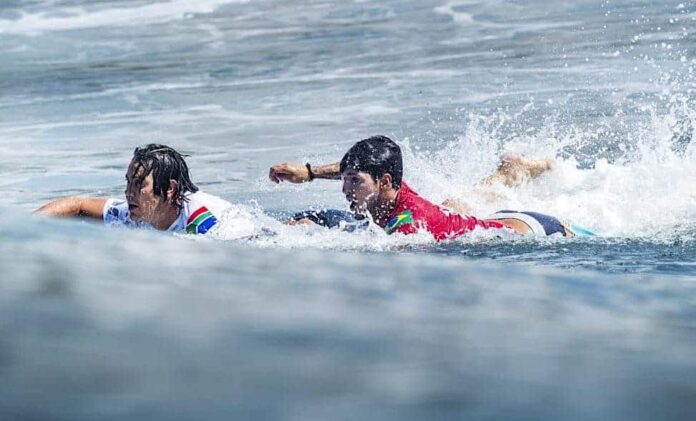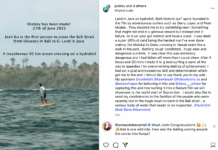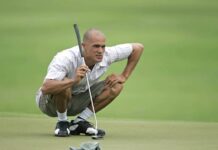
“You know,” Joe said, “I’ve never been a quitter … never quit anything in my life.”
Joe paced his living room, doing the moves: he was gonna prove why this charge was bullshit, and that charge was bullshit. … Yeah, but when could he make the case? The campaign was dying. Fund-raising … forget it. …
“You know,” Joe said, “I’ve never been a quitter … never quit anything in my life.”
It wasn’t that Joe didn’t see the logic. He’d known since he got home, and started talking with the family: he’d have to get out. He had no way to fight. …
Biden stepped up to the podium, topped with a fungal bouquet of microphones. …
“Although it’s awfully clear to me what choice I have to make, I have to tell you honestly, I do it with incredible reluctance—and it makes me angry.” …
“But folks, be that as it may, I have concluded that I will stop being a candidate for President of the United States.”
-Richard Ben Cramer, “What It Takes: The Way to the White House,” (1992)
Once upon a time, in a different Olympic year long since past, Joe Biden quit the race for the White House, his thoughts and words eerily foreshadowing the events of the last few days.
The year was 1988. A different decade, a different century, seemingly a different lifetime ago, an era without internet or social media or Fox News or phone cameras or even cell phones period.
Back then you didn’t have anything that could give you a hint of what might be over the horizon. No internet rumor mill, no TMZ or online access to London tabloids, no BeachGrit to float wildly unfounded speculation about who might do what when.
You simply kept peering over the metaphorical ledge, craning your neck to catch a glimpse of the future even as your daily news was limited to the local broadsheet and whatever Peter Jennings or Dan Rather or Tom Brokaw thought sufficiently important to discuss.
Surf-related intel was even more scarce. Once a month you would flip maniacally through the newest issue of Surfer — or if you didn’t care about the words on the page adding up to coherent sentences, Surfing — scanning the article titles, scrutinizing the contest box scores in the back pages, hungry for whatever nuggets might be had.
If you were really lucky there might be a new surf flic making its dutiful East Coast run, stopping by the local cinema for a one night special screening where all the hot kids would gather and the second tiers would loaf around the fringes sneaking cigarettes in the shadows and speculating about Ronnie Giesing’s competitive future as Giesing himself passed time macking on the blonde girls with Tropicana tans and three swatches to a golden forearm loitering under the marquee lights.
Without the slow and steady drip of rumors and speculation, when news did break it hit like the sudden headlamp glare of a surging locomotive appearing out of the darkness.
It’s nearly impossible to capture the electricity of those moments in words, the feelings you experienced when something momentous materialized, seemingly out of thin air.
Of course, it’s possible my experience was unique. Maybe for others the political and diplomatic news from the world outside our Treasure Coast bubble didn’t make a dent.
But my dad was a national affairs junkie, a former eagle scout and himself the son of a real life legit congressional medal and everything WW2 hero.
He had come through the Cuban missile crisis convinced Kennedy was a milquetoast pussy and then decided during the Goldwater campaign of ‘64 that Democrats were hell bent on destroying America and then done backflips of ecstasy when Reagan took out Carter in ’80 and Mondale in ‘84 and always did stuff like refer to the newspaper published in the county south of us as the “Palm Beach Pravda,” as if the socialite crowd hanging at The Breakers’ pool was down with the Kremlin.
Washington D.C. and Moscow and Havana and all the other shit mattered inside our four walls.
As luck and cosmic laws of nature beyond our control would have it, the news-soaked 12 months or so surrounding Biden’s withdrawal from the presidential race was peak ‘80s experience:
- Biden withdrew because he lifted portions of his campaign speeches from a UK politician without attribution
- Democratic front-runner Gary Hart’s campaign imploded after snoopy photogs took snaps of him on the yacht Monkey Business with girlfriend Donna Rice
- Michael Dukakis (the eventual Democratic nominee) torched his campaign when photos of him uncomfortably perched in the driver’s seat of an M1 Abrams tank made him look nerdier than Zuckerberg with a face slathered in zinc
- Biden used his sudden free time (plus a little boost from Harvard Law Professor Laurence Tribe) to eviscerate the Supreme Court hopes of uber-conservative judge and co-founder of the Chicago School of Antitrust Policy Robert Bork
- American Olympians swaggered into Seoul with great expectations only to be trounced in the medal count by the Soviets (plus even their communist allies from East Germany)
- Australian Olympians stumbled into Seoul still reeling from the cultural assault of the recent release of “Crocodile Dundee II,” but a trio of gold medals helped salve their psychic wounds
- Even better from the Aussies’ perspective, Damian Hardman and Barton Lynch celebrated their country’s bicentennial by stealing ASP world title trophies back from Curren
This all made for seriously red meat in my adolescent world, where Democrats and Communists and Australian goofy footers were considered existential threats to America’s manifest democratic and surfing destiny.
But when I think back on those heady days of ‘88, it isn’t Biden quitting presidential campaigns or Americans losing Olympic medals or Australians not named Occy stealing world titles from anointed Californians that stands out.
In my teenage world, these were the stories that occupied my head, but none of them stole my heart.
That special place belonged to a Day-Glo-covered VHS that appeared unannounced on the shelf of my local surf shop and a certain English by way of South Africa phenom featured inside.
Everything else that happened in 1988 fades in comparison, like the atonal warm-up of the symphony before the maestro raises his baton.
When I slipped Wave Warriors III into the yawning mouth of my VCR, the sounds and images that spewed forth forever altered the course of my surfing life.
I couldn’t have been more enraptured if I had found golden tablets in a New York wilderness — it became my scripture, my touchstone, the constant that stuck with me while politicians came and went, political promises were made and broken, Olympic medals were won and lost, aspiring Supreme Court justices drawn and quartered.
The film opens with a series of clips from the North Shore — Off the Wall, Pipeline and Sunset are the focal points of the first 10-12 minutes. But it’s after this dutiful nod toward surfing’s ancestral home that the movie really kicks into gear, when the narrative driving the story flips from places to people.
Matt Archbold, Gary Elkerton, Christian Fletcher, Herbie and Randy Laine on jet skis, Derek Ho and Gerry Lopez, Dane Kealoha, Martin Potter, Todd Holland and Kelly, Dino Andino / Jeff Booth / Nathan Fletcher, and even Johnny Boy Gomes all get a nod, each of their parts ricocheting into the other.
Christian Fletcher was the centerpiece of the flic, punting and ripping and pulling into what I only now realize were mediocre North Shore barrels, all to a frenzied punk soundtrack that was perfectly in sync with his frantic style.
Archie was close behind, his savage slashes a notch above Christian’s, his overall performance a notch lower, mainly because he had no Hawaiian clips and, suspiciously, the film didn’t showcase his aerial attack beyond a couple of laughable hops, one clear non-make (the edit doesn’t show the landing), and a halfway decent little backside punt. (The careful editing must have been Herbie’s way of making sure Archie didn’t outshine Christian.*)
Elkerton displayed, figuratively speaking, his legendarily massive cojones in big surf, particularly Sunset and Waimea.
But like when you find the girl of your dreams, it was Martin Potter’s section that really set my heart on fire.
It wasn’t his look. Pottz was no blonde beach Atlas. His curly dark hair, grizzly chest, and black and gold Ray Bans were more Atlantic City blackjack dealer than world tour ripper.
His surfboard had flames painted on it, which reminded me of the NASCAR rednecks in Okeechobee, not my spray-curtain-throwing idols at the Inlet.
And he wore webbed gloves — at Trestles — a surf gear choice that will live in infamy as the most sponsor-pandering move ever recorded on acetate.
But his surfing — my god.
My 15-year-old self melted as I watched him flowing down those San Clemente lines, gathering speed like an F1 rocket with DRS activated, floating over sections, high lining, and when the timing was just right putting his blade on a rail to torque off all that velocity.
Since I hadn’t spent much time in a half pipe, as much as I admired Fletcher’s surfing I couldn’t really relate to his skate-inspired style, couldn’t see myself ever surfing like him.
But I could absolutely go fast. I was light and twitchy and could skim along the surface of our windswept Florida waves like a basilisk on the long narrow thrusters we all kept in our quivers.
And I could float the shit out of those beachbreak sections.
In my mind’s eye, I could see myself surfing like Pottz, flowing along in perfect harmony with the swell, high lines and low lines and all the in-between lines finely calibrated to maximize the transfer of kinetic energy between rider and wave.
I could be Martin Potter.
From that moment on, I was obsessed. Every time I popped to my feet I imagined those scenes of webbed fingers and a flaming board under the feet of surfing’s Schumacher, racing down the line at Trestles, pumping and floating and carving — and I tried to catch him.
Even Potter’s forgettable string as a world tour commentator couldn’t dampen the ardor of my passion for the surfing he did during his ASP era.
Today, it’s 36 years later.
Joe Biden is still quitting presidential contests.
Olympians are still grasping for medals.
Wave Warriors III is still apex surf cinema.
And every time I drop in, I’m still chasing Pottz.
*To be clear, like any vintage piece, the stuff above the lip doesn’t hold a candle to what’s going on in and over the water these days and routinely available for easy sampling in your IG feed. We’re comparing Christian and Archie to their 1988 peers, not Albee Layer or Noa Deane’s latest.
**This past April (2024), Nalu.TV started carrying all of the Wave Warrior videos on the site, you can rent each for six bucks. I went back and watched WWIII to see if it still hits the same. I was struck by how many pocket rides made the final Hawaiian edits and reminded of the central role Sunset used to play in the surf media universe — and the Pottz part still hit, taking me right back to pre-first-bell dawn patrols and peering through seagrape trees at perfect 2-3’ Treasure Coast peelers.





